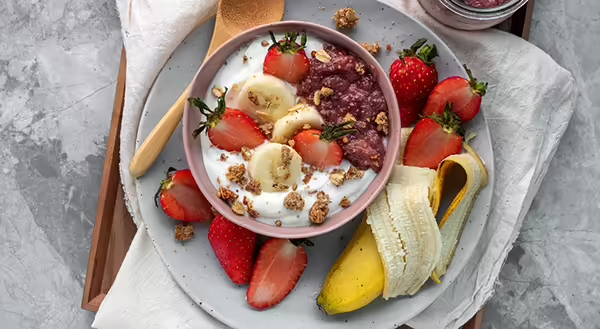
A nutritious diet is important for teens to ensure proper growth and development. For teens that play sports or engage in regular exercise, additional calories and nutrients are needed to fuel and recover from exercise without compromising growth and future health.
Participating in school sports can play a role in improving physical, mental, and social health for teens. It can also make them HUNGRY! Following a nutritious diet is important for teens, whether they’re active or not, to ensure proper growth and development. For teens that play sports or engage in regular physical activity, additional calories and nutrients are needed to fuel and recover from exercise without compromising growth and development.
While there’s no shortage of pricey supplements, sports drinks, and power bars on the market, these are not necessary. Fueling teens for sports and exercise can be done with everyday foods you likely already have at home. It’s all about eating enough and eating the right nutrients at the right time.
Teens may be susceptible to feeling like their body needs to look a certain way. Pressure may come from social media, coaches, peers, or the culture of certain sports to lose or gain weight. Trying to gain weight too quickly can backfire since it takes time to gradually build muscle, so increasing calorie intake too rapidly or by too much will result in increasing fat mass, which may not be the desired result.
On the other hand, restricting calories can lead to disruptions of growth and development, increased rates of injury (even a lasting risk of bone injury), reduced sports performance, and decreased mood, energy, and academic performance. For these reasons, dieting or restricting calories is not recommended for teens unless monitored by a health care provider.
Essential Nutrients for Active Teens
All three macronutrients – carbohydrates, proteins, and fats – play an important role in a nutritious diet and provide specific benefits to sport and exercise performance and recovery.
Carbohydrates
Carbohydrates are the body’s primary source of energy. Carbohydrates are stored in the muscles and liver to provide energy when needed. Carbohydrates are important for fueling exercise, the brain, and other bodily systems. For general health, it’s recommended to focus carbohydrate intake on whole grains, fruits, and vegetables. For athletes, it’s important to add in an easy-to-digest, high-carbohydrate snack 1 to 2 hours before practice or exercising. These pre-workout snacks should focus on simple carbs, which the body can use more quickly for energy during their workout or sports practice. For more tips on pre-workout snacks, check out the Fueling for Fitness blog.
Proteins
Proteins are the building block of tissues in the body, including muscle tissues. Adequate protein intake is important to build and repair muscles. Protein bars and shakes are popular but are not necessary since teens can easily get enough protein from food sources such as meat, dairy, beans, and nuts. A protein bar can be a good option for busy teens looking for an easy-to-pack snack but be wary of protein bars that are high in saturated fat.
Protein works best when consumed throughout the day since the body has a limit to how much protein it’s able to utilize at one time. Active teens should aim to add a quality serving of protein to breakfast, lunch, and a post-workout snack in addition to dinner.
Fats
Fats are an energy source, particularly during longer duration and lower-intensity exercise. Additionally, fats play an important role in regulating hormones, helping the body to absorb and use fat-soluble vitamins, and nervous system function. Fats are essential for proper growth and development for teens. Aim for most fat intake to come from unsaturated fats that are found in fish, nuts, seeds, some grains, and most vegetable oils.
Key Micronutrients for Active Teens
Eating a balanced diet with a variety of fruits and vegetables is an effective strategy for ensuring your teen consumes important vitamins and minerals. There are a few key micronutrients, however, that are especially important for active teens.
Iron
Iron helps transport oxygen to the muscles and plays an important role in energy production. Consuming enough iron is essential for everyone, but athletes who menstruate are at a higher risk of having an iron deficiency. As a teen goes through puberty and begins menstruating, they may need to pay extra attention to their iron intake. For teens age 14 to 18 years old, females should aim to consume 15 mg of iron per day and males should aim to consume 11 mg per day.
Calcium and Vitamin D
Calcium and Vitamin D help bones grow strong and aid in repairing bone tissue after exercising. Since active teens are both growing and recovering from workouts, it’s vital they consume adequate levels of calcium and vitamin D to keep their bones healthy now and in the future. Some food and drink products such as cereals, milk, and orange juice are fortified with calcium and vitamin D. Other good sources of calcium include yogurt, cheese, salmon, tofu, and kale. Vitamin D is found in salmon, tuna, and mushrooms. Active teens should aim to consume at least 900 to 1,200 g of calcium per day and at least 15 mcg of vitamin D per day.
Remember, fueling your teen for exercise and sports doesn’t have to use expensive supplements or specialty food items. If your teen does choose to use protein bars or powders or other supplements, look for the NSF or USP verified seal to ensure the supplement is safe.
Resources
- MyPlate.gov
- IDEA Fit – Nutrition for Young Athletes
- NASM – Workout and Nutrition Timing
- Nemours Children’s Health – Feeding Your Child Athlete